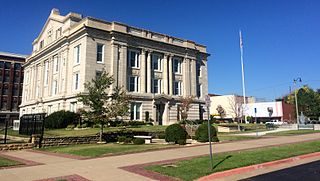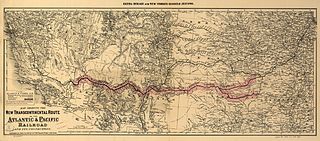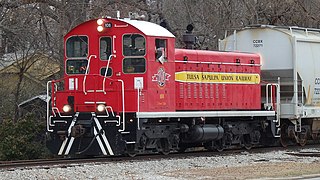
Sapulpa is a city in Creek and Tulsa counties in the U.S. state of Oklahoma. The population was 20,544 at the 2010 United States census, compared to 19,166 at the 2000 census. The population as of 2022 is 22,205. As of 2019, the estimated population was 21,278. It is the county seat of Creek County.

The St. Louis–San Francisco Railway, commonly known as the "Frisco", was a railroad that operated in the Midwest and South Central United States from 1876 to April 17, 1980. At the end of 1970, it operated 4,547 miles (7,318 km) of road on 6,574 miles (10,580 km) of track, not including subsidiaries Quanah, Acme and Pacific Railway and the Alabama, Tennessee and Northern Railroad; that year, it reported 12,795 million ton-miles of revenue freight and no passengers. It was purchased and absorbed into the Burlington Northern Railroad in 1980. Despite its name, it never came close to San Francisco.
Watco Companies, L.L.C. (Watco) is a transportation company based in Pittsburg, Kansas, formed in 1983 by Charles R. Webb. Watco was composed of four divisions: transportation, mechanical, terminal and port services, and compliance. Watco is the owner of Watco Transportation Services, L.L.C. (WTS), which operates 41 short line railroads in the U.S. and Australia. It is one of the largest short line railroad companies in the United States. As of December 2018, it operates on 5,500 miles (8,900 km) of leased and owned track. Also under transportation is the contract switching the company provides service for 30 customers. That was the service that Watco originally offered before it branched out into other areas.

The Alabama Southern Railroad is a class III railroad that operates in the southern United States. The ABS is one of several short line railroads owned by Watco. The railroad operates an 85-mile (137 km) line leased from the Kansas City Southern Railway. It began operating in 2005.
The Arkansas Southern Railroad is a short-line railroad which started service in October 2005. ARS operates two disconnected lines consisting of Heavener, Oklahoma to Waldron, Arkansas, and Ashdown to Nashville, Arkansas, plus a switch track at Ashdown, for a total of 63 miles. The lines are leased from Kansas City Southern Railway (KCS) to ARS's owner, the Watco Companies (Watco).

The Wichita, Tillman and Jackson Railway is a shortline railroad subsidiary of the Rio Grande Pacific Corporation that operates in Oklahoma and Texas. The line for which it is named extends from Wichita Falls, Texas to just north of Altus, Oklahoma, through Wichita County, Texas, Tillman County, Oklahoma, and Jackson County, Oklahoma. It interchanges with the Union Pacific (UP) and BNSF at Wichita Falls, with Farmrail (FMRC), Stillwater Central Railroad (SLWC), and the BNSF at Altus, and with Grainbelt (GNBC) at Frederick, Oklahoma. It carries predominantly grain, chemicals and agricultural products.

The Atlantic and Pacific Railroad was a U.S. railroad that owned or operated two disjointed segments, one connecting St. Louis, Missouri with Tulsa, Oklahoma, and the other connecting Albuquerque, New Mexico with Needles in Southern California. It was incorporated by the U.S. Congress in 1866 as a transcontinental railroad connecting Springfield, Missouri and Van Buren, Arkansas with California. The central portion was never constructed, and the two halves later became parts of the St. Louis-San Francisco Railway and Atchison, Topeka and Santa Fe Railway systems, now both merged into the BNSF Railway.
OmniTRAX, Inc. is a transportation and transportation infrastructure holding company based in Denver, Colorado, in the United States. It primarily owns or operates railroads, with a network of 25 regional and shortline railroads in 12 U.S. states and three Canadian provinces. It is one of the largest privately owned railroad companies in the United States. The firm also invests in, develops, and operates ports, multimodal transportation terminals, and industrial parks.

Central Oklahoma is the geographical name for the central region of the U.S. state of Oklahoma. It is also known by the Oklahoma Department of Tourism designation, Frontier Country, defined as the twelve-county region including Canadian, Grady, Logan, Oklahoma, Cleveland, McClain, Payne, Lincoln, Pottawatomie, Seminole, Okfuskee, and Hughes counties.

Oklahoma City Union Depot is a building in Oklahoma City, Oklahoma that served as a "union station" from 1931 until 1967. It was listed on the National Register of Historic Places in 1979. It now houses the main office of the Central Oklahoma Transportation & Parking Authority.

South Kansas and Oklahoma Railroad is a short line railroad which operates 511 miles (822 km) of rail lines in Kansas, Oklahoma and Missouri that used to belong to Missouri Pacific, Frisco and Santa Fe lines. SKOL is a unit of Watco. The present railroad was created in July 2000, when Watco merged one short line railroad, the Southeast Kansas Railroad (SEKR), with another short line, the South Kansas and Oklahoma Railroad. SKOL was the surviving company.

Transportation in Tulsa, Oklahoma includes a bus network and a system of raised highways and primary thoroughfares, laid out in mile-by-mile increments. In addition, throughout its entire length in Tulsa, historic Route 66 is a drivable road, with motels and restaurants reminiscent of the route's heyday era.

Iowa Pacific Holdings was a holding company that owned railroad properties across North America and the United Kingdom, as well as providing services such as railcar repairs, leasing, management and consulting services to other operators. The company was founded in 2001 with headquarters in Chicago, Illinois.
The Eastern Flyer was a proposed medium distance inter-city train traveling between Oklahoma City in central Oklahoma and Tulsa in north-eastern Oklahoma. It was originally planned to be a private operation by the Iowa Pacific Railroad, and its services were to have included a dome car, coaches and full meal service. This would have been the first regular passenger service to Tulsa since the Santa Fe discontinued service in 1971.

Tulsa-Sapulpa Union Railway Company, L.L.C. is a Class III shortline rail carrier which operates freight service between Tulsa, Oklahoma and Sapulpa, Oklahoma over 10 miles of track known as the Sapulpa Lead, as well as leases and operates a 12.9 mile section of Union Pacific track known as the Jenks Industrial Lead between Tulsa and Jenks, Oklahoma. The line connects with two Class I railroads, being the Union Pacific at Tulsa and the BNSF at Sapulpa, and additionally connects to its fellow Class III shortline, the Sand Springs Railway, in Tulsa. It is owned by the Collins Family Trust. Major customers on the Sapulpa Lead include Technotherm, Prescor, and Ardagh Glass, and on the Jenks Industrial Lead, the Sinclair Oil Refinery, Kentube, Word Industries, Pepsi Cola, and Kimberly-Clark.
The Timber Rock Railroad (TIBR) is a shortline rail carrier operating in the states of Texas and Louisiana. Its single line runs from Kirbyville, Texas to DeRidder, Louisiana, about 41.5 miles. It is owned by the Watco Companies.











